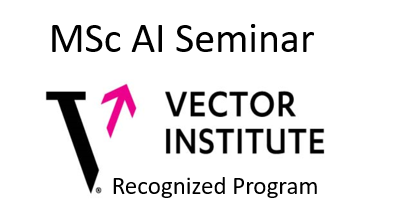Thursday, August 12, 2021 - 09:00 to 11:00
SCHOOL OF COMPUTER SCIENCE
The School of Computer Science is pleased to present…
MSc Thesis Defense by: Akshay Mukundbhai Shah
Date: Thursday, August 12, 2021
Time: 9:00 am – 11:00 am
Meeting URL: https://zoom.us/j/92246731976?from=addon
Passcode: If interested in attending this event, contact the Graduate Secretary at csgradinfo@uwindsor.ca
Abstract:
Knowledge Graph (KG) represents the real world's information in the form of triplets (head, relation, and tail). However, most KGs are generated manually or semi-automatically, which resulted in an enormous number of missing information in a KG. The goal of a Knowledge-Graph Completion task is to predict missing links in a given Knowledge Graph. Various approaches exist to predict a missing link in a KG. However, the most prominent approaches are based on tensor factorization and Knowledge-Graph embeddings, such as RotatE and SimplE. The RotatE model depicts each relation as a rotation from the source entity (Head) to the target entity (Tail) via a complex vector space. In RotatE, the head and tail entities are derived from one embedding-generation class, resulting in a relatively low prediction score. SimplE is primarily based on a Canonical Polyadic (CP) decomposition. SimplE enhances the CP approach by adding the inverse relation where head embedding and tail embedding are taken from the different embedding-generation classes, but they are still dependent on each other. However, SimplE is not able to predict composition patterns very well. This paper presents a new, hybridized variant (HRotatE) of the existent RotatE approach. Essentially, HRotatE is hybridized from RotatE and SimplE. We have used the principle of inverse embedding (from the SimplE model) in a bid to improve the prediction scores of HRotatE. Hence, our results have proven to be better than the native RotatE. Also, HRotatE outperforms several state-of-the-art models on different datasets. Conclusively, our proposed approach (HRotatE) is relatively efficient such that it utilizes half the number of training steps required by RotatE, and it generates approximately the same result as RotatE.
Keywords: Knowledge Graph, Link Prediction, Knowledge Graph Completion
MSc Thesis Committee:
Internal Reader: Dr. Kalyani Selvarajah
External Reader: Dr. Mitra Mirhassani
Advisor: Dr. Ziad Kobti
Chair: Dr. Pooya Moradian Zadeh
MSc Thesis Defense Announcement 
5113 Lambton Tower 401 Sunset Ave. Windsor ON, N9B 3P4 (519) 253-3000 Ext. 3716 csgradinfo@uwindsor.ca (working remotely)
